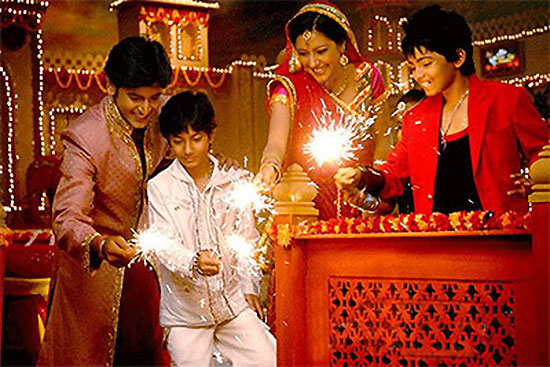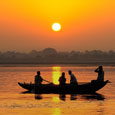Celebration of Diwali Around The World

The festival of Diwali has been celebrated for ages and grows in attraction by the year. Everyone enjoys the goodies, the shine, glamour, and the endless enthusiasm for living that suddenly grips people around this time. But there is much more to Diwali than feasting and merrymaking. Diwali is a holy tradition, not to be put in the shade by the lights. Deepawali symbolizes the victory of light over darkness. Celebrated joyously all over the country, it is a festival of wealth and prosperity. Dipawali is essentially a festival for householders. The preparations, the rituals, the entire celebration focuses on the home and family, spanning out to cover the community as a natural extension. Diwali is a festival synonymous with celebrations in India and among Indians all over the world, is an occasion for jubilation and togetherness. This is an occasion for young and the old, men and women, rich and poor - for everyone. Irrespective of their religious and economic background, the festival is celebrated throughout the country to ward off the darkness and welcome the light into their lives. At a metaphysical level, Deepawali is a festival signifying the victory of good over evil; the latter is destroyed and reduced to ashes by fireworks is the belief of the people. This festival is celebrated on a grand scale in almost all the regions of India and is looked upon mainly as the beginning of New Year. As such the blessings of Lakshmi, the celestial consort of Lord Vishnu are invoked with prayers. Diwali is also celebrated outside India mainly in Guyana, Fiji, Malaysia, Nepal, Mauritius, Myanmar, Singapore, Srilanka, Trinidad and Tobago, Britain, Indonesia, Japan, Thailand, Africa, and Australia among the Hindus world over. Places as far as Southern America have record of celebrating Diwali.
Diwali celebrations in Britain
The Indians are the second largest ethnic minority in Britain. To get rid of the feeling of missing their homeland, especially during festival times, the Indians here celebrate most of the festivals. The occasion is marked by visit to the local temple to worship the shrine of Lakshmi, which they have made for Diwali. Eating special sweets, burning of incense sticks, lighting the home and surroundings and the blowing of the conch shell follows the prayer session in the Lakshmi temple. The festival here is celebrated according to the Hindu solar calendar hence it falls in the months of October-November, amongst the cold, damp and windy months in Britain. Still the enthusiasm of the festival celebration makes the task of leaving small lamps on windowsills or by open doorways possible ignoring the chill. The lamps and diyas play their part in maintaining the atmosphere of Diwali at home.
Diwali celebrations in Guyana
Guyana, formerly known as British Guiana, is located on the northeast coast of South America. Guyana is 82,978 square miles in area and has a population of about 7,70,000. Hindus constitute 33% of Guyana's total population. The Co-operative Republic of Guyana in Southern America celebrates Diwali according to the Hindu Solar calendar. The day of the festival is declared as a national holiday in the official calendar of Guyana. The tradition of celebrating the festival is believed to have been brought to Guyana in the year 1853 by the first indentured people from India. The legends related to the festival are similar to that of India. The celebration of the festival includes, distribution of sweets, illuminating the inside and outside of the house, exchange of greetings, cleaning of houses and wearing of new clothes. The celebrations hold special significance for the people of Guyana. The distribution of sweet signifies the importance of serving and sharing whereas exchange of greeting cards denotes the goodwill of each other. The sweets distributed mainly consist of pera, barfi, and kheer. The tradition of wearing new cloth for the people of Guyana is significant especially in this festival. They believe that wearing new cloth is the symbol of healthy souls in healthy bodies. Cleaning of their homes and keeping them well illuminated in and outside is a practice meant to illuminate the road for Goddess Lakshmi so that while goddess Lakshmi visits their home she faces no problem of light as the diwali night is regarded as the darkest night of the year.
Diwali celebrations in Indonesia
The name Indonesia came from two Greek words: "Indos" meaning Indian and "Nesos" meaning islands. The majority of population follows Islam. Hindus constituent about 2% of Indonesia's total population. However, the Indonesian island of Bali is famous for celebrating the festival of Diwali, as a majority of the population here is that of Indians. It is one of the most revered festivals of the locals here. The celebration and rituals of the festival is mostly similar to that celebrated by their counterparts in India.
Diwali celebrations in Malaysia
Fascinating in its diversity, Malaysia has many mesmerizing charms and attractions. With a population of about 20 million, comprising of a harmonious multi-ethnic mix of Malays, Malaysia promises a colorful potpourri of cultural traditions. Most are based on the various religious practices, beliefs and traditions influencing the costumes, festivals, ceremonies and rituals. The Hindu community of Malaysia constitutes about 8% of its total population .The community celebrates Diwali as a symbol of triumph of good over evil. The Malaysian people call diwali as Hari Diwali. This festival is celebrated during the 7th month of the Hindu solar calendar. The south Indian traditional of oil bath precedes the festivities. The celebration includes visits to temples and prayers at household altars. Small lamps made from clay and filled with coconut oil and wicks are a common sight to signify the victory of Lord Rama, the hero of the Hindu epic Ramayana, over the demon king Ravana. Diwali is celebrated almost all over the Malaysia except in Sarawak & Federal Territory of Labuan.
Diwali celebrations in Mauritius
Mauritius is an island in the Indian Ocean that lies to the east of Madagascar. This beautiful landmass is full of picturesque landscapes and enchanting spots. Mauritius accounts a 63% of Indian majority of which 80% follow Hinduism. Hence, celebration of almost all the Hindu festivals in this island is a common phenomenon. In Mauritius, Diwali celebration is an age-old tradition. It holds special significance for the natives, who believe that Diwali has been celebrated even long before the return of Lord Rama from 14 years of exile and his coronation as the king. The festival is marked by lightening of earthen lamps in rows making images out of the rows. Lakshmi is worshipped as the goddess of wealth and crackers are burnt to scare away evil spirits.
Diwali celebrations in Nepal
Nepal is a landlocked country nestled in the foothills of the Himalayas. Nepal, a multi-ethnic and multi-lingual society is the only Hindu Kingdom of the world. Diwali is celebrated here with the usual Hindu festivities and rituals. Diwali in Nepal is known as Tihar. Just like most places in India Diwali is celebrated here to honor the goddess of wealth and god of prosperity Lakshmi and Ganesh respectively. The festival of light falls in the months of October or November on the day of Amavasya - the darkest day of the year. The festival here continues for five days. Every day has its special significance. The first day is dedicated to cows as they cook rice and feed the cows believing that goddess Lakshmi comes on cows. The second day is for Dogs as the Vahana of Bhairava. Preparation of delicious food especially meant for the dog is a typical characteristic of the day. Lights and lamps are lit to illuminate the entire surrounding and some of the specialty items are prepared to mark the third day of the festival. Fireworks, Lamps and crackers are widely used. The fourth day is dedicated to Yama, the Hindu God of Death. He is prayed for long life. The fifth final day is Bhhaya Dooj dedicated for the brothers who are wished long life and prosperity by their sisters.
Diwali celebrations in South Africa
South Africa is located at the southern tip of the continent of Africa. The South African culture is a mix of variety of cultures. Asians in South Africa constitute two per cent of South Africa's population, and most are of Indian origin. Indians in South Africa are descended from indentured labourers who were brought by the British from India in the 19th century, mostly to work in sugar plantations or mines (especially, coal) in KwaZulu-Natal (KZN) and later also from traders who emigrated to South Africa. A decade prior to the colonization by the United States of America, the nation had the largest immigrant Indian community in the world. Interestingly, Indian South Africans form the largest group in the world of people of Indian descent born outside India. At present, South Africa has almost one million immigrant Indians most of whom are concentrated in the eastern regions of Natal and Transvaal of the country. About 65% of Hindus, 15% of Muslims and 20% of Christians live in this area. Due to the majority of the Hindu population, a number of Hindu festivals are celebrated here. Naturally, Diwali also holds an important place in the festival calendar of the region. The celebration is more or less same to that in India. A new book on Indian indentured labourers reveals that the 2007 Diwali Celebrations in South Africa marked the 100th year of celebrations of the festival in the country.
Diwali celebrations in Trinidad and Tobago
Trinidad is the most southern of the Caribbean islands, lying only seven miles off the Venezuelan coast, is one of the most exciting, colorful islands of the West Indies. Considered as the land of the Humming Bird, Trinidad and Tobago has a good number of Indian population. For that reason, Hindu festivals, customs, traditions and observances forms an integral part of the society, which comprises the unique beauty of the twin island state. The Diwali celebration has a unique flavor here in the Caribbean island nation. Here 43 per cent of the 1.3 million populations are ethnic Indians. The Diwali celebrations are usually marked as an occasion to unify the nation that consists of Hindus, Muslims, Christians, Indo-Trinidadians and Afro-Trinidadians. The festival day is regarded as a national holiday. The festival is also marked by scores of functions besides the usual rituals of the festivity. The functions and celebrations also have an official imprint as the Ministers of the Government also participate in the celebrations sometimes. The belief behind the festival is same as of India, which is, prevalence of good over evil. The celebrations continue for over a week and the headquarters of the National Council of Indian Culture at Diwali Nagar becomes the focal point.
Send Diwali Greeting cards


 Friendship Day
Friendship Day Good Morning
Good Morning